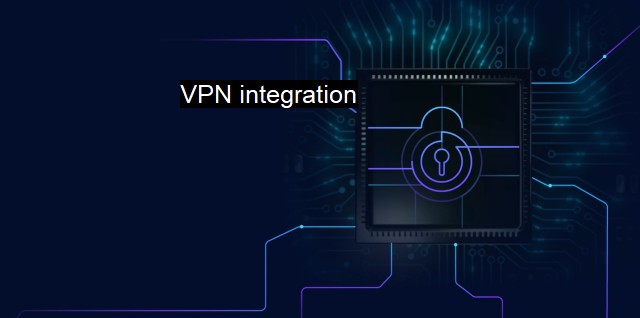What is VPN integration?
Understanding VPN Integration: A Comprehensive Guide to Cybersecurity and Antivirus Software for Safe Communication over Public Networks
VPN or Virtual Private Network is a tool used to create a secure, encrypted connection between a user's device and the network it is accessing, creating an invisible tunnel through which data can travel safely. VPN integration, in the context of cybersecurity and antivirus software, refers to the process of incorporating VPN functionality into such tools or systems.Fundamentally, VPN technology is focused on securing connections, offering confidentiality, and safeguarding data integrity. The essence of a Virtual Private Network is in securely connecting two points over an unsecured network like the internet. It makes whatever data transmitted between these points unintelligible to anyone who intercepts it, thereby maintaining confidentiality and securing the data from interference or unauthorized access.
Originally invented to securely connect branch offices or remote employees to company’s main office, VPN has now become more common in individual use, especially with rising concerns of online privacy and security. In this modern digital era where threat actors continually seek out vulnerabilities to exploit, cybersecurity has been paramount, with VPN playing a vital role in establishing trusted connections.
VPN integration with cybersecurity applications or antivirus programs is aimed at fortifying these programs' defenses, presenting an additional or complementary layer of protection. For instance, antivirus software provides protection against malicious software and scripts, while an integrated VPN can ensure the data a user transmits over the Internet is immune to eavesdropping or interception by securing the network. This blend of localized threat prevention and network security creates a formidable defense against various forms of cyberattacks.
VPN integration can prove specifically beneficial when connecting to public WiFi networks, which are known to be rife with vulnerabilities that are easily exploited by hackers. If your antivirus software integrates a VPN, it can automatically establish secure connections when accessing such networks, safeguarding your data from anyone with sinister intent lurking on these networks.
Thus, the merging or integration of VPN into antivirus programs can create a well-rounded, comprehensive solution for protecting both the data residing on user devices and data in transit on the wire. This approach not only makes it challenging for threat actors to compromise a system or access data, but also makes a full-scale data breach even more difficult.
Encrypting connections also means that user information like browsing history, personal details, and overall digital footprints are concealed from Internet Service Providers, advertising agencies, and even the government. Therefore, on top of being a security measure, the combination of VPN and antivirus software provides an additional benefit of preserving user privacy.
With the landscape of cyber threats continuing to evolve and become increasingly sophisticated, the integration of VPNs into cybersecurity suites and antivirus software becomes progressively relevant and presents a logical response. In powering security software with VPN capabilities, cybersecurity product developers can provide end-users with more robust, comprehensive digital security solutions that provide protection against an extensive range of cyber threats, while also ensuring data privacy.
VPN integration is an impactful advancement in the sphere of cybersecurity and antivirus programs. It not only ensures online security and data protection but also prioritizes the privacy of the user, marking a considerable shift in internet safety. As always, users ought to ensure they utilize trusted and reliable antivirus programs with VPN integrations for optimal results in their cybersecurity strategy.

VPN integration FAQs
What is VPN integration and why is it important for cybersecurity?
VPN integration involves integrating a virtual private network into your cybersecurity system. The VPN provides an added layer of security for your system and protects your data from cyber threats, such as hackers and malware attacks. VPN integration is crucial for maintaining the privacy and security of your online presence.How does VPN integration work with antivirus software?
VPN integration and antivirus software work hand in hand to provide comprehensive cybersecurity protection. When integrated, the VPN encrypts your internet traffic, making it more difficult for cybercriminals to intercept your data. Antivirus software, on the other hand, detects and removes malware and other types of malicious software that may have made its way onto your device. Together, these tools offer a more robust defense against cyber threats.What types of businesses can benefit from VPN integration for cybersecurity?
Any business that deals with sensitive data, such as customer information, financial data, or proprietary information can benefit from VPN integration. This includes businesses in the financial industry, healthcare providers, and government agencies, to name a few. VPN integration can help businesses protect their data and maintain the trust of their customers.Is it difficult to integrate a VPN into an existing cybersecurity system?
Integrating a VPN into an existing cybersecurity system can be a straightforward process when working with an experienced cybersecurity professional. The difficulty will depend on the current setup and systems in place. However, many VPN providers offer user-friendly software that simplifies the integration process. Working with a trusted cybersecurity partner can ensure a seamless integration that delivers better protection for your business.| | A | | | B | | | C | | | D | | | E | | | F | | | G | | | H | | | I | | | J | | | K | | | L | | | M | |
| | N | | | O | | | P | | | Q | | | R | | | S | | | T | | | U | | | V | | | W | | | X | | | Y | | | Z | |
| | 1 | | | 2 | | | 3 | | | 4 | | | 7 | | | 8 | | |||||||